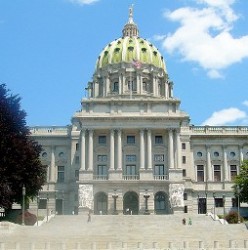Online Gambling Bill Introduced In Pennsylvania Senate

A few weeks ago Pennsylvania State Sen. Edwin Erickson announced his intention to introduce online poker-only Senate Bill 1386 to the state legislature. Erickson has now made good on his promise, but interestingly, the text of the bill has been altered slightly from the original draft to allow for the possible future introduction of all forms of internet gambling games.
Expansion beyond poker
The original draft of bill SB 1386 contained a line restricting gaming operators to offering just online poker:
“Authorized game.” Any interactive game approved by the board pursuant to this chapter. The board only may approve poker games pursuant to this chapter.”
In the new version of bill the line now reads:
“Authorized game.” Any interactive game approved by the board pursuant to this chapter.”
Therefore, in spite of references being made to poker in the new Bob Mensch (R- Montgomery) co-sponsored bill, and the fact the text seems geared towards the online poker industry, it would appear there is now support for introducing all types of online gambling games in Pennsylvania.
Allows for interactive gaming agreements
Recognizing the importance of forming player sharing pools with other jurisdictions, SB 1386 also allows Pennsylvania the freedom to enter into agreements with other states so long as the approved games are legal in those other states.
Tax rate of 14% on gaming revenue
The online poker bill proposes an initial licensing fee of $5 million, and subsequently sets the tax rate levied on operators at 14% of their gross gaming revenues. Unlike previous proposals, such as the one suggested by State Rep. Mario Scavello to criminalize those poker players gambling on unlicensed sites, SB 1386 envisages no such penalty for players visting either unlicensed online poker or casino sites.
Bad actor clause
The senator’s online poker bill also includes a “Bad Actor” clause which effectively bans those companies obtaining a license which continued operating in the US after December 31, 2006. In fact, the clause is so strongly worded that even PokerStars would find it a struggle to enter the Pennsylvania market, in spite of its recent acquisition by Amaya Gaming. A “presumption of unsuitability” extract, for instance, is used to refer to entities which:
“Purchased or acquired, directly or indirectly, in whole or in significant part, a third party described in paragraph (1) or will use that third party or a covered asset in connection with interactive gaming.”
Will SB 1386 pass?
Last year State Representative Tina Davis (D-Bucks County) saw her bill to regulate online gaming stall in committee, and many are wondering whether State Sen. Edwin Erickson’s latest efforts will also meet a similar fate. Nevertheless, this time around their is more cause for optimism with industry experts seemingly in agreement that Pennsylvania is now one of the states most likely to next legalize online gambling.
Commercial and political support for internet gambling remains high in Pennsylvania, especially as the Keystone State currently faces a huge $1.2 billion gap in its budget. Up until recently, Pennsylvania has been able to balance its books through its land-based casino industry, which since 2007 has been generating around $3 billion in annual revenues and $1.4 billion in tax revenues. Last year, however, revenues contracted for the first time ever, making the need to seek out new sources of income more pressing for the state. As Sharon Ward, director of the Pennsylvania Budget and Policy Center, explained at the time:
“The only way you can close a deficit of that size is with budget cuts in areas such as health care or education, or with revenue increases.”
If an Econsult feasibility study proves accurate, Pennsylvania can expect to earn a further $129 million in yearly revenues if it adopts online poker regulation. Highlighting the opportunities igaming could offer Pennsylvania, Erickson’s SB 1386 then states:
“Developments in technology and recent legal decisions have created an opportunity to legalize interactive poker as a means to further enhance and complement the benefits delivered by casino gaming, licensed facilities and the communities in which they operate.”
Hurdles remain
In spite of some justifiable optimism, there are still a number of hurdles which could stymy efforts to see Pennsylvania throw in its lot with the other regulated states of Nevada, Delaware, and New Jersey. Las Vegas Sands, for instance, which runs Sands Casino Resort in Bethlehem, has voiced strong opposition concerning the impact online betting could have on its land-based operation, with Andy Abboud, VP of government relations and community development for Las Vegas Sands Corporation (LVSC), stating that “we’re looking at turning every house in Pennsylvania into a casino. Gaming was never expected to be everywhere.”
In addition, it is not at all clear whether current Governor of Pennsylvania Tom Corbett would approve SB 1386 if it should ever land on his desk.










